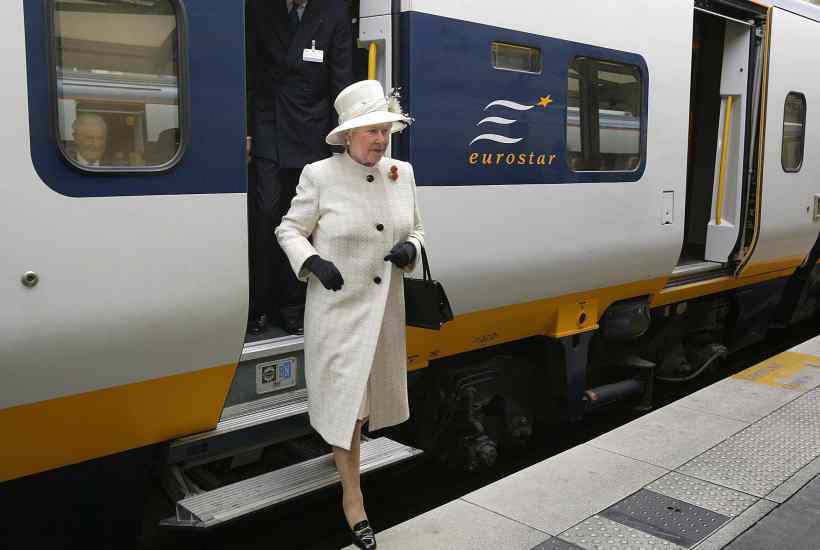The tribute paid by France to Her Majesty Queen Elizabeth II has been heartfelt, fulsome and moving. French media across the board have paid generous homage, as though to one of their finest, to Britain’s longest serving monarch – surpassed in world history only by Louis XIV acceding as a babe-in-arms. This vicarious Panthéonisation was admirably encapsulated by Emmanuel Macron, the 10th French president the British sovereign had known. In a moving video in English posted on Twitter on Friday, foregrounded against the Union Jack, he poignantly encapsulated the feelings of his people and their ‘emptiness’ at the British monarch’s death: ‘To you she was your Queen; to us she was the Queen’.
President Macron reminded us that the Queen’s six state visits to France are unsurpassed by any head of state, not to mention the host of unofficial visits she made in a private capacity to race courses and Normandy horse breeders. ‘With her, France and the United Kingdom shared not just an “entente cordiale” but a warm, sincere and loyal partnership.’ And the President added that the Queen will always be with us and we will commemorate and perpetuate the values she ceaselessly incarnated and promoted: the moral force of democracy and liberty.
That Britain and France have been joined historically since the 11th century needs no repeating. Much of the ceremony in the coming days of succession has its roots in Norman and French traditions shared with France’s 1,000 years of monarchy. Even today the sovereign promulgates parliamentary bills with the Norman French words ‘La Reyne le veult’ (The Queen wishes it) now to be ‘Le Roy le veult’. The President rounded off his tributes with a personal letter to King Charles III that has not been made public. He could have added a reference to recent history when in 1940 and again in 1956 our two countries discussed the constitutional possibility of a joint regime with shared citizenship.
Other than the genuine outpouring of French grief stretching from the French people to its politicians, including the head of the French Communist Party, Fabien Roussel, something deeper is happening. For all our recent differences outside forces and now the Queen’s death have shown what the two nations share deeply. And President Macron appears to wish to build on it. Britain will be slower to move on this because of its sense of injustice at France’s, and especially Macron’s, treatment of her since Brexit.
But Macron is already preparing reconciliation with the UK. It began when one of his closest unofficial advisors, a ‘visiteur du soir’, the economist Alain Minc wrote a piece in Le Figaro, poignantly on 14 July, indicating ‘it was time to resuscitate the Entente Cordiale between France and the United Kingdom’, now that Boris Johnson had gone. While casting most of the blame on Johnson, he nonetheless claimed like other Anglophiles to be ‘wounded’ by this ‘sad divorce’. And he explains that this ‘acrimonious relationship has obscured a major strategic issue: Britain may have left the European Union but it has not left Europe.’ He believes that reconciliation cannot come via the EU, as that technical relationship will continue to be fraught. The initiative, he insists, must come from Macron to the new British Prime Minister and should take the form of a new and irreversible agreement that goes further than the important, but publicly unsung, Lancaster House security and defence agreements.
Change on the British side in the form of a new Prime Minister and government, on the French side in President Macron’s much weakened domestic and international authority since the elections, could be an opportunity for closer relations in the shadow of the shared grief over Queen Elizabeth’s death. Given the Prime Minister’s recent comment about ‘the jury being out’ on whether Macron is a friend or not, there will need to be some tangible gesture by the French President. If that signal were given, it would be possible for the much postponed ten year Lancaster House agreement celebrations, scheduled for 2020, to act as a reboot of closer relations. Without that gesture a harmonious relationship will remain lettre morte.
Got something to add? Join the discussion and comment below.
Get 10 issues for just $10
Subscribe to The Spectator Australia today for the next 10 magazine issues, plus full online access, for just $10.



















Comments
Don't miss out
Join the conversation with other Spectator Australia readers. Subscribe to leave a comment.
SUBSCRIBEAlready a subscriber? Log in